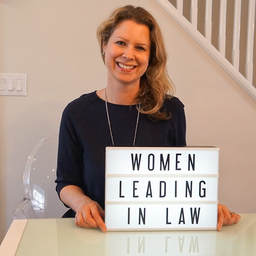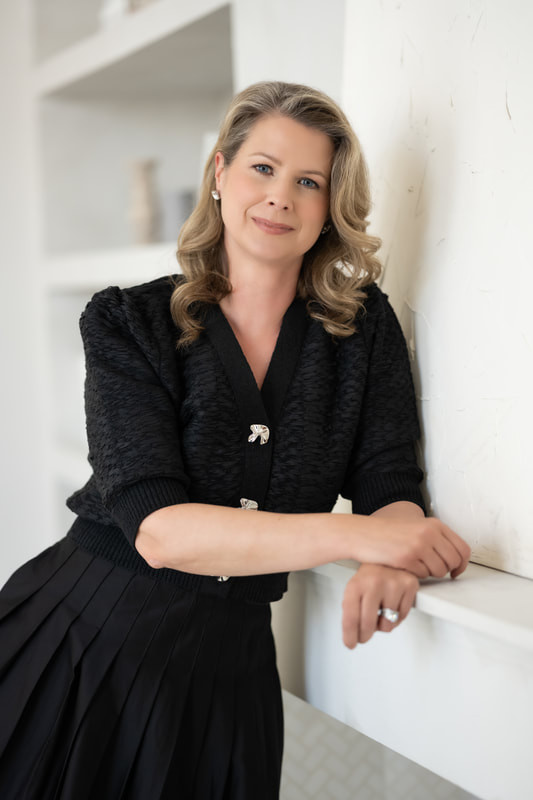 We continue the Women Leading in Law series this week with a profile of Renatta Austin, a family and criminal law lawyer and owner of Eglinton West Law Office. Some of you may remember Renatta from an article in Precedent magazine in 2015 discussing how she was growing her solo practice out of the Great Library in Toronto. Clearly someone who understands the business side of law, Renatta's profile provides insights into the freedom, as well as the responsibilities, of being a law firm owner: 1. Tell me a little about your practice or business: I am the owner of the Eglinton West Law Office. We are a small law firm offering legal services in the areas of family law and criminal law, with a focus on child welfare issues. Our clients tend to be a mix of young, legally-aided parents and mid-income homeowners and renters from the diverse neighbourhoods surrounding our office. Over the last four years, the firm has evolved from a part-time solo practice, which I operated out of the Great Library, to a three-person firm staffed by two law clerks and me. I made the decision to narrow my focus to the intersection of family and criminal law because of my interest in child welfare issues and due to the demand from the community. I live in the Eglinton West area and was aware of the relatively low commercial rents, growing demand for legal services and lack of lawyers in this part of the city. Once I hung my shingle, I was bombarded with requests for assistance with child protection issues, custody/access disputes and domestic violence cases in both family and criminal court. I saw an opportunity and I took it! I have two fantastic law clerks who take care of a lot of the administrative work that comes with practice, allowing me to spend most of my time in court. We run a pretty tight ship, but I am constantly looking for new ways to be more efficient, to innovate and to grow. I am very fortunate that I get to do work that I enjoy and bring my whole self to my work. 2. Why did you go to law school? My first love was theatre, but I was always one of those kids everyone said would become a lawyer, mostly because I got good grades and talked too much. When I started law school, I thought I would become a constitutional law professor. I majored in Political Science and Criminology during my undergraduate studies and developed an interest in the Constitution, federalism and local governments. I thought academia would be a natural fit for these interests. To my surprise, I found reading federalism cases to be a painful exercise and decided that a policy-oriented role in government would be the next best thing for me. I articled with the City of Toronto and started my career in the municipal sector. A little over two years in, I decided to opt out of a steady paycheque and a pension to pursue sole practice. 3. How did you get to where you are today? Design? Chance? Both? I would say both. The practice I have now was not part of my early life plan. During law school, I recall saying that I could never practice criminal, family or immigration, because I am too much of a bleeding heart to do front-line legal work. I thought I would be better suited to working on broader policy issues with institutional clients. However, reflecting on it, I see how everything I did prior to becoming a sole practitioner led me to where I am today. I have always been a fiercely independent, entrepreneurial and public-interest oriented person. Most of my volunteer work from high school onward focused on women, children and youth. Given my interest in constitutional law, it makes sense that most of my work touches on the relationship between the state, children and their families, which is a very underdeveloped area of Charter litigation. Although sole practice was not part of my early plan, once it became clear to me that this was what I wanted to do, I went into goal-setting and execution mode. I recognized that mentorship, continuing education and developing a niche would be important to my success. While I took family law and criminal law courses in law school, I did not article in these areas. I joined practice-specific and solo-friendly legal associations and invested in every CLE course I could find to develop competence in these areas. I also spent a lot of time shadowing other lawyers and observing proceedings from the back of courtrooms. The first couple of years involved a lot of figuring things, some embarrassing moments and many long nights and weekends, but it ultimately paid off. Hard work was an important part of my journey, but I never lose sight of the role luck has played in my life. I am fortunate to have a supportive family and great mentors and peers who’ve helped me along the way. By hanging around court and putting myself out there early on, I met fantastic mentors who taught me both how to practice law and about the business of law. I still contact them regularly for advice. I’ve also benefited from great business advice and mentorship from other small business owners, including my dentist, my accountant and many of the local business owners in my neighbourhood. 4. What is your most significant achievement? What are you proud of? I have done a lot of things in my 32 years of life, but I am most proud of building a law firm from the ground up and not going bankrupt or losing my mind in the process. Perhaps other than parenting, starting a business is the hardest thing I can imagine doing in my lifetime. It is harder than getting good grades, harder than the LSAT and harder than any case I’ve worked on. I have had to learn how to be a competent lawyer while also figuring out everything from how to negotiate a lease, make money, pay taxes, hire and afford to pay good staff to ensuring that the lights stay on. There are days when it feels overwhelming and I wonder what on earth I was thinking when I made the decision to do this. But each time a client thanks us for the effort we put into their case, a lawyer or a judge compliments the quality of our work, or someone walks into the office and marvels at the fact that I – a young, Black woman who does not look a day over 25 (seriously!)—am “the lawyer”, the significance of the firm really sinks in. I genuinely enjoy my work and I know that this is exactly where I was meant to be. I am proud of myself for having the courage and tenacity to take such a big risk and for making it work. I hope that other young lawyers will see that solo practice doesn’t have to be a last resort and will give it serious thought if they have an entrepreneurial spirit. 5. What are some key challenges, and more importantly, opportunities for women in law? I think about this question a lot, particularly in the context of solo practice. I have always been engaged with issues affecting women in the legal profession, but over the past few years it has become clearer to me that we need more women in positions of leadership in law and at government decision-making tables. Much of our legal system, profession and work culture reflects a traditional model of family life that is not in line with modern reality, especially for women. We know about the glass ceiling and high attrition rates for women in private practice. In some ways, solo practice is a great option for women lawyers. It gives you the freedom to be your own boss, choose your own clients and to control your schedule. It can be a very lean operation, similar to what I had when I first started, or it can take the form of a more traditional practice with a physical office and staff, which I have now. Many colleagues have told me that they decided to start their own practice after having children because of the flexibility and ability to work around their family’s needs. Young women interested in family law, a traditionally “pink” area of law, should know that there are lots of senior women sole practitioners in family law (less so in criminal law). I’ve found these women to be great role models and mentors. That being said, there are many challenges that come with sole practice. Sole practitioners typically lack a stable and predictable income, there are no benefits or paid leaves, and depending on the type of practice, it can be as demanding as Bay Street. Many family and criminal lawyers have told me stories about returning to work within weeks of giving birth or having to rebuild their practice from scratch after taking a leave. Some of my colleagues who have student debt and lack financial support from family or a partner have told me that having children or owning a home seem completely unattainable for them as sole practitioners. I often think about what it would look like if I had children, became ill, or suddenly found myself having to care for my aging parents. How would I make it work? What would happen to my practice and my income? How do I balance my desire to do good work with my short-term and long-term needs? What will retirement look like for me? Many women deal with these issues at some point in their career, but it is especially acute for sole practitioners. Despite these challenges, there are many opportunities for women to have rewarding careers in solo practice. With the right amount of patience, tenacity and willingness to take risks, it is possible to build a practice that suits your lifestyle, is in line with your values, is in an area you enjoy and that allows you to make a living. My hope is that increasing the number of women in positions of power will help to change our legal system, work culture and broader social policies so that women lawyers can better balance career with other important aspects of life, including family. 6. What advice would you give a woman starting her legal career? My advice to women starting their career in law is to claim your space. We are often told to put our head down, work hard, play by the rules and wait for our turn. That approach has not worked for a lot of women who feel like they lack control over their lives and careers or find that they’re still bumping up against all kinds of glass ceilings. I say kick down the ceiling and claim your space. Regardless of where you are in the legal profession, put yourself out there, demand opportunities and push back against the workplace culture and norms that cause women to leave law. Men are not losing out on their investment in a legal education. Why should we? ----------------------------------------------------------------------- Thanks Renatta for agreeing to be profiled in this series. Another amazing woman with some wonderful tips we can all use. ICYMI: Previous posts profiled Janis Criger, May Cheng, Nicole Chrolavicius, Charlene Theodore, Dyanoosh Youssefi, Shannon Salter, Bindu Cudjoe, Elliot Spears, Jessica Prince, Anu K. Sandhu, Claire Hatcher, Esi Codjoe, Kate Dewhirst, Jennifer Taylor, Rebecca Durcan, Atrisha Lewis, Vandana Sood, Kathryn Manning, Kim Hawkins, Kyla Lee, and Eva Chan. Sign up to have these profiles sent directly to your email address and stay tuned for the next post soon! I started this blog series because I was tired of hearing about women leaving law and wanted to hear about women leading in law. The "Women Leading in Law" series focuses on good news stories and highlights amazing women succeeding in the legal profession. Each post includes the profiled lawyer's answers to six questions. Prepare to be inspired! The series will continue until December 2018.
1 Comment
|
Erin C. Cowling is a former freelance lawyer, entrepreneur, business and career consultant, speaker, writer and CEO and Founder of Flex Legal Network Inc., a network of freelance lawyers.
Categories
All
Archives
December 2022
|
|
(C) 2014-2024 Cowling Legal. All rights reserved.
|
Please note I am not currently practicing law.
Information on this website does not constitute legal advice and is for informational purposes only. Accessing or using this website does not create a solicitor-client relationship. See website Terms of Use/Privacy Policy. info@cowlinglegal.com
3080 Yonge Street, Suite 6060 Toronto,ON M4N 3N1 (appointment only) |







 RSS Feed
RSS Feed
